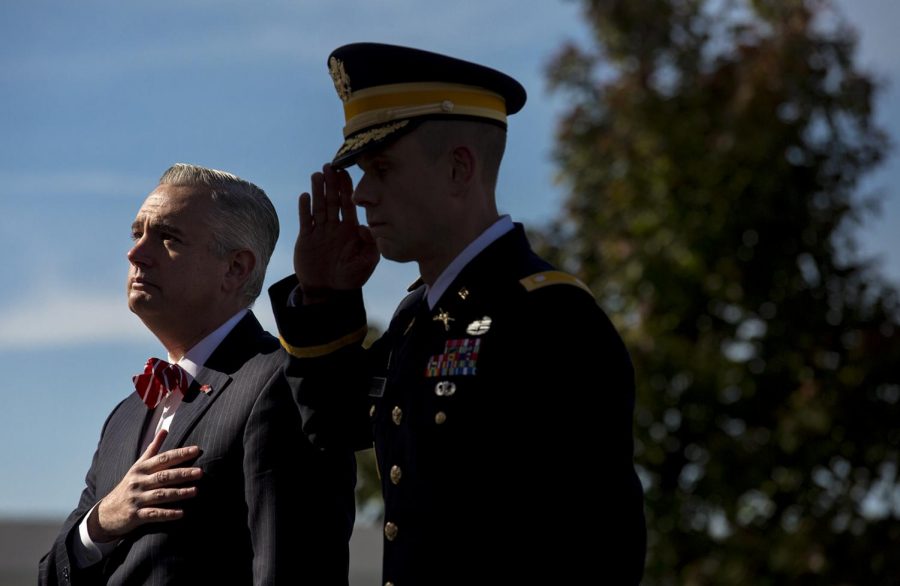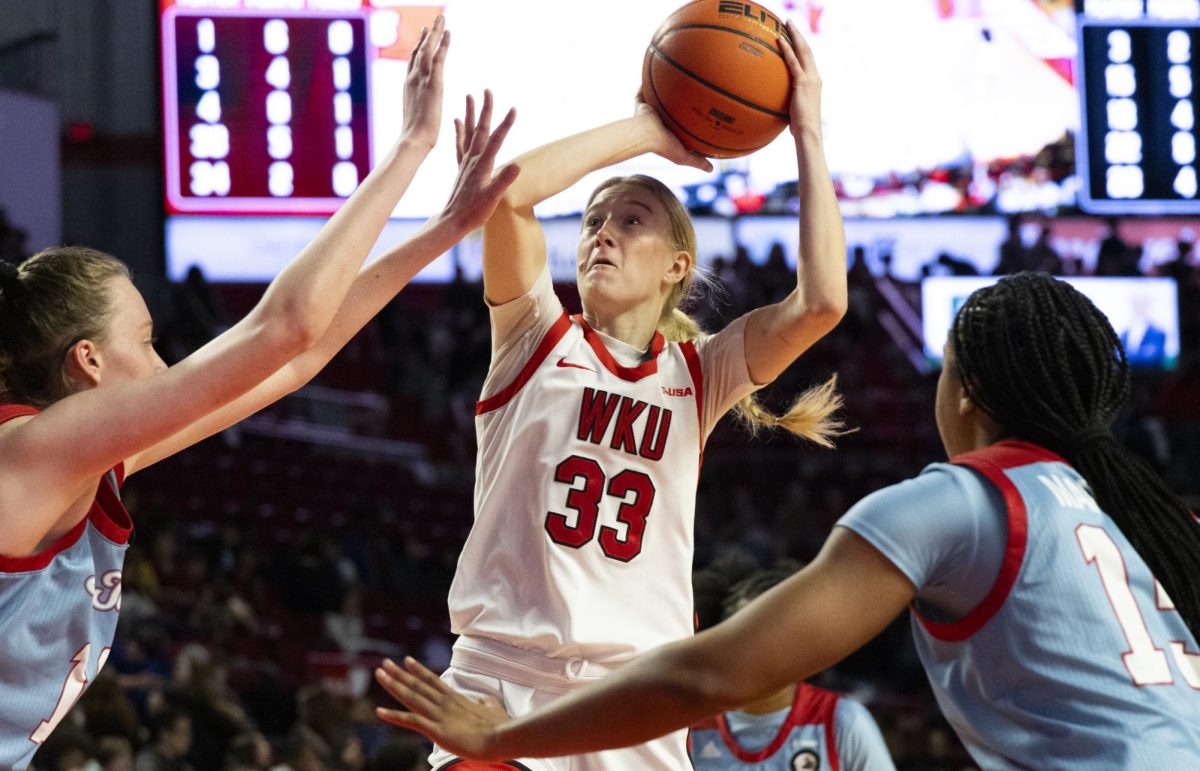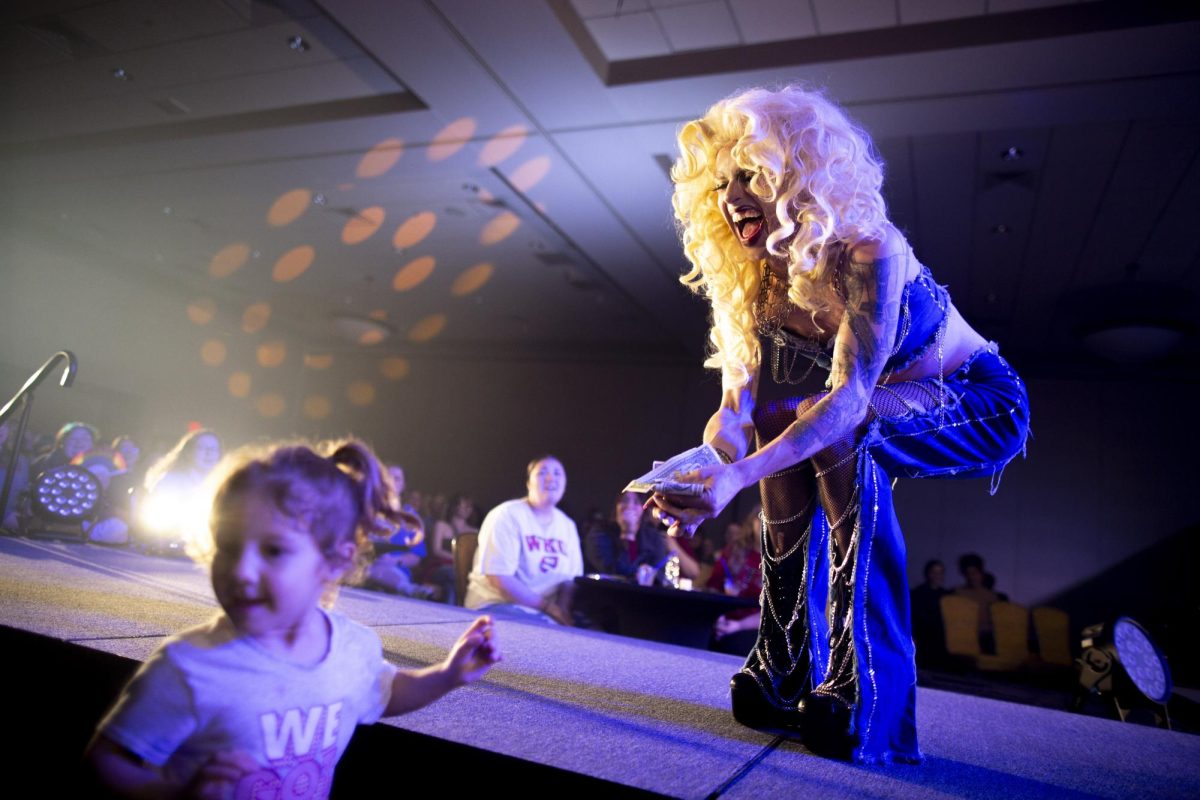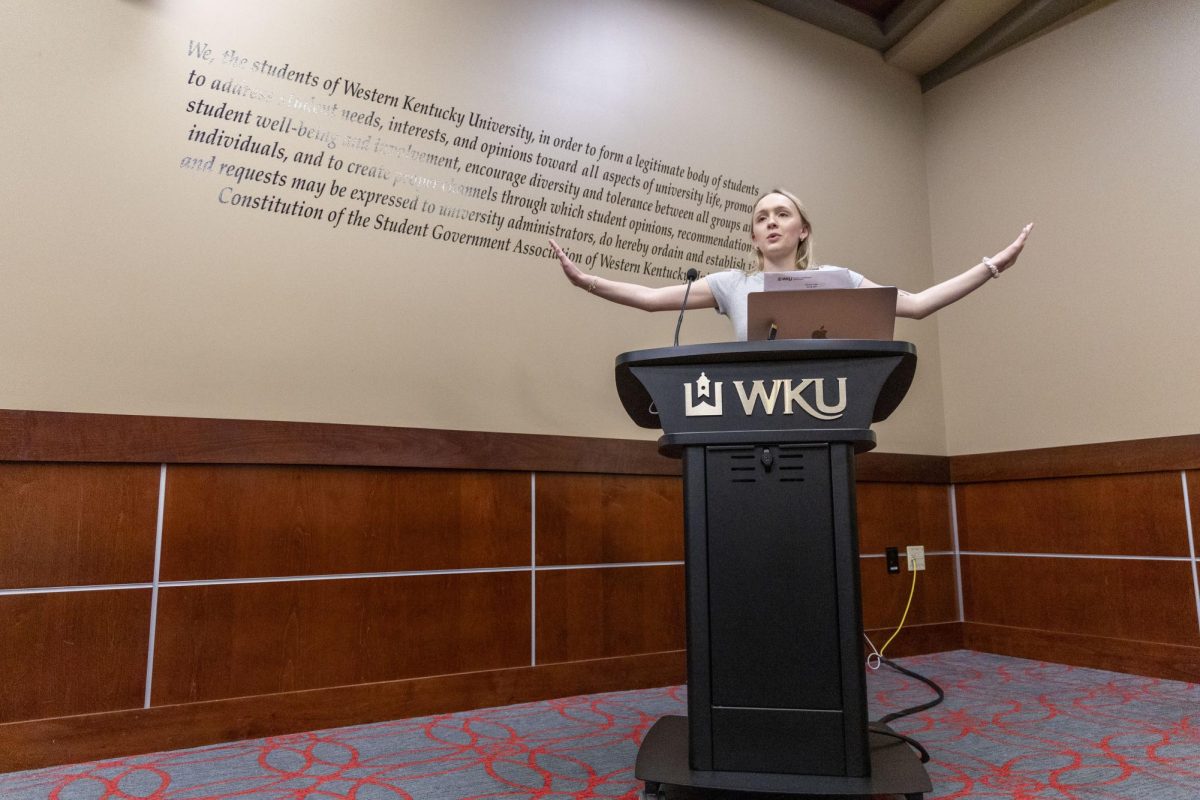Reflecting on the 10th president’s first semester
November 30, 2017
Standing behind a new transparent podium, President Timothy Caboni addressed the faculty and staff for the first time as president of WKU at his opening convocation. A little over six weeks before, he officially stepped into his new role after a five-month transition period.
In his speech, Caboni said during the transitional period he held meetings and listened to stakeholders in WKU to analyze what the next steps would be. In order to create student success, Caboni had a new charge and plan for WKU.
“To inspire innovation, elevate communities and transform lives,” Caboni said, will steer the university toward the mission of a “student centered, applied research university.”
Throughout the rest of the address, Caboni said the university would be looking ahead in a strategic way and laid out the core strengths and areas of growth.
During the fall 2017 semester, there have been administrative differences, major and minor, between Caboni and his predecessor Gary Ransdell, who held the position for 20 years.
A Leading American University
During Ransdell’s administration, the tagline “A Leading American University with International Reach” could be found on WKU business cards, advertisements, speeches and websites. When Caboni began his role as president, the motto was removed from several mediums, including the university website.
Caboni was contacted through the Office of Media Relations for comment, but did not respond in time for publication.
SGA president Andi Dahmer has gone abroad four times and is also planning future trips. When deciding which college to attend, Dahmer said the motto influenced her decision to attend WKU.
When she arrived at WKU, Dahmer said she found the international programs were an “outstanding” feature of the university.
“The core mission rang so true,” Dahmer said.
Dahmer said the ability to meet international students and go abroad is a unique experience she hopes will be maintained.
Patricia Minter, a former faculty regent and senator in the University Senate, said she is relieved the motto has seemingly been removed. She said while on the Board of Regents, a branding consultant was hired and reported that the motto was testing poorly because of misunderstanding and dislike.
Still, Minter said these reports were ignored.
“Caboni made an extremely wise decision getting rid of that on day one,” Minter said. “It was not effective, and it spoke to a cult of personality.”
Craig Cobane, executive director of the Mahurin Honors College, said he is not concerned about the international programs because similar visions expressed by Caboni hold similar values. As an example, Cobane said important WKU programs under Ransdell such as athletics were not named in the vision, but were still prominent programs.
“Regardless of how you phrase it, it’s taking a young person with big dreams and giving them the skills and ability that they can make those big dreams happen,” Cobane said.
At the convocation, Caboni announced he was reorganizing the international program, appointing Gordon Johnson as the Interim Chief International Officer for the 2017-18 academic year. Caboni charged Johnson and a task force to examine the international programs and create recommendations for how to improve the organization of these programs.
From Caboni’s opening convocation, Cobane said he could see Caboni’s commitment to international programs through this action and the attention he gave the programs in the speech.
Cobane said students need to have international exposure through study abroad or through interactions with international students on campus in order to be prepared for life after graduation.
“We live in a global village,” Cobane said. “Everything we deal with in our world relates to international.”
When he arrived at WKU in 2005, Cobane said the number of students who studied abroad was in the hundreds and the majority of these programs were short, faculty-led trips.
WKU enrollment in study abroad programs increased from 583 in 2009-10 to 1,353 in 2010-11 and the enrollment for 2016-17 was listed as 1,460, according to the WKU Student Profile.
For the 2016-17 academic year, WKU was ranked third in the master’s institution class as a top Fulbright producing institution, according to the Chronicle of Higher Education. This was the fourth time WKU had been ranked as a top Fulbright producing institution.
“International is a part of the university and always has been part of the university,” Cobane said. “What the vision is, international is still going to be important.”
Shared Governance and Student Input
David Lee, provost and vice president of academic affairs, said he has witnessed differences in the communication styles between Caboni and Ransdell. Lee said Ransdell was a successful leader with an established way of communicating, whereas Caboni is from a “different generation,” with different communication tools.
“He’s still exploring, I think, the best strategies and the best processes that work for him,” Lee said.
From what he has seen so far, Lee said Caboni has appeared energetic and receptive to new ideas through including diverse perspectives in the decision making process.
Minter said it is still early in Caboni’s administration to decisively describe faculty relations. She said Ransdell’s interactions changed over time, in the second ten years of his presidency after receiving tenure, Ransdell was less interested in shared governance.
During the College Heights Herald’s meeting with the administrative council in January, then-president Ransdell said he thought the term “shared governance” was “used a little too loosely.”
“Shared governance doesn’t mean everyone shares on every decision,” Ransdell said at the meeting, later adding it also “doesn’t mean everyone is equal in every decision.”
Through her current positions, interactions and observations, Minter said she believes Caboni is still “feeling his way” through the idea of shared governance.
During Caboni’s first semester, there have already been policy changes that impact faculty. One of the early changes was bringing back spousal benefits, announced at his opening convocation on Aug. 18.
Spousal tuition benefits for WKU employees were cut during the spring 2016 budget cuts. Minter said the return of these benefits was a “gesture of good faith,” and an easy way for Caboni to show the faculty that he was listening.
“Every time the president can make a good faith effort to meet people where they are and show that he’s listening is a good idea,” Minter said.
In regards to faculty communication, Minter said she believes Caboni has made this past semester not about him, but about WKU and how he can improve the university. A small change to represent this is the seating at Board of Regents meetings.
While Ransdell sat at the head of the table next to the Board of Regents chair at meetings, Caboni now sits toward the end, near presenters. Minter said she this reflects shared governance and a shift towards more discussion among the board.
“I find it refreshing that president Caboni understands he is the president of the university but that doesn’t mean he is the university,” Minter said.
Dahmer said there has also been a change in how the president of the university communicates with students. During Ransdell’s administration, Dahmer said a lot of student interaction was done through his office.
Dahmer said Caboni “makes the trek to [Downing Student Union]” to make a physical appearance in meetings with SGA. Additionally, Caboni has included students in the strategic planning process.
During these meetings and interactions, Dahmer said Caboni has illustrated a willingness to be transparent. She said Caboni has made an effort to include everyone and answer questions to the best of his ability, or refer students to someone who could answer their question.
Budgeting for the Future
In March 2017, WKU anticipated a $6.5 million budget shortfall, according to a previous Herald article. This has led to policy and administrative changes made by Caboni.
New leadership was appointed for the budget council in September. Indudeep S. Chhachhi, chair of the budget council, said Caboni also created a new charge for the council and set priorities.
“He’s emphasized the human capital over the physical capital,” Chhachhi said.
Under Ransdell, Chhachhi said the council would give advice on how to manage new money. Chhachhi said Caboni has charged the council to recommend a way to fill the budget shortfall and create a plan for WKU to avoid future shortfalls.
While Chhachhi said Caboni’s presidency is still in the early stages and budget changes won’t be seen for at least another year, there have been some policy or allocation changes.
Under Ransdell, the carry forward policy, which previously let departments with one-time or left over funds to keep those funds as money to use in the future, was changed. Carry forward funds would first go toward covering the budget shortfall, with leftover funds allocated to the departments.
The Fiscal Year 2016-17 WKU Operating Budget estimated $29.8 million of carry forward funds to be used to cover the shortfall. In an email, Kimberly Reed, assistant vice president for resource management and budget director, said about one-third of total divisional carry forward was returned to each division who were in the process of making further allocations.
Many departments across WKU, such as academic affairs, were impacted by this policy change. Ladonna Hunton, associate vice president of academic budgets and administration, said college deans and the provost worked to protect departments or programs where student learning and success were the primary mission.
Lee said the carry forward funds will cover the entire budget shortfall, which is now anticipated to fall somewhere between $10 million and $15 million.
Caboni also introduced a new approval process for personnel actions in October. This created a new way of hiring faculty and staff positions.
“Only those positions that meet critical needs, meet strict standards for strategic needs, result in cost savings or efficiencies or are deemed to fulfill essential services will be approved to proceed,” Caboni said in an October email.
With the change, personnel actions are being reviewed by a non-academic committee, which Minter said she finds troubling. Minter said she hopes to see Caboni demonstrate a priority towards the academic mission and programs that aid that mission.
Minter said the new announcement caused some frustration among faculty. However, Minter said she realized it was not a problem caused by Caboni and is a result of the current budget crisis.
During her time as faculty regent, Minter said she advised against unnecessary spending by Ransdell and predicted it would come back to “haunt” the university.
“President Caboni didn’t make this mess,” Minter said. “It is unfortunately his to clean up, and this is certainly one of the unfortunate side effects.”
In a previous version of this story, President Timothy Caboni was quoted as saying “To inspire innovation, elevate communities and transform universities” at the August convocation. Caboni said “To inspire innovation, elevate communities and transform lives.” The Herald regrets the error.
Reporter Rebekah Alvey can be reached at 270-745-6011 and rebekah.alvey660@topper.wku.













